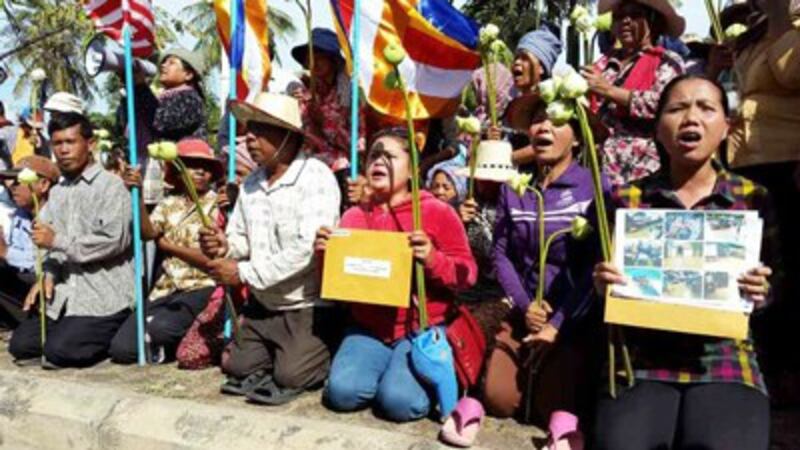A United Nations envoy on Thursday urged Cambodia’s government to respect the law and principle of judicial independence, as he expressed regret over the arrests and convictions of nearly a dozen land activists last week.
In a statement, Surya Subedi, the U.N.’s special envoy on human rights in Cambodia, also called on the country’s judiciary to exercise its authority independently of external forces.
“It saddens me to see the courts being used again and again as a tool of the executive,” said Subedi, who has been in his current position since March 2009, and will step down in January.
“The lack of judicial independence is one of the central obstacles to achieving the just, inclusive society that Cambodians strive for. The recent conduct of the courts demonstrates once again the need for an independent judiciary in Cambodia.”
Subedi highlighted the cases of 11 land activists recently arrested and sentenced to a year in prison each for participating in nonviolent protests in the capital Phnom Penh.
Seven of them, all women, were sentenced on Nov. 11—a day after they were arrested for obstructing traffic while protesting a development project backed by a lawmaker from Prime Minister Hun Sen’s ruling Cambodian People’s Party (CPP).
Four others—including a monk—who protested against their arrest, were also taken into custody and sentenced to a year each for “aggravating a rebellion.”
“Those who seek to exercise fundamental freedom can be arrested, charged, and convicted on little or no material grounds,” Subedi said, noting that Cambodian law requires court judgments to be based only on evidence.
The envoy also questioned the arrests of opposition Cambodia National Rescue Party (CNRP) members—including head of the CNRP’s information department Meach Sovannara—for their part in an alleged “insurrection” during a July 15 protest in Phnom Penh’s Freedom Park.
To date, 17 CNRP members and supporters have been charged since July in connection with the demonstration during which protesters, calling for the park’s reopening, clashed with security forces.
Subedi noted that none of the security personnel responsible for deaths and injuries in the past year, including during the Freedom Park protest, have been called upon to account for their actions.

Petitioners
Subedi’s remarks came as roughly 100 villagers petitioned the Australian, U.S., British, and French embassies, and the office of the EU, in Phnom Penh to pressure the municipal court for the release of the activists, monks, and politicians.
The villagers also asked the embassies to monitor the Nov. 25 trial of Loun Sovath, the Buddhist monk who was arrested last week along with three other Boeung Kak community activists for “aggravating a rebellion.”
Residents of the Boeung Kak community have battled authorities for years over the eviction of thousands of families to make way for a development project that has yet to materialize.
Also on Tuesday, Ministry of Justice spokesman Kem Santepheap told RFA’s Khmer Service that the ministry could not intervene in court affairs on behalf of CNRP information chief Meach Sovannara, in response to a request by CNRP President Sam Rainsy.
Sam Rainsy had sent a letter to Minister of the Interior Sar Kheng asking that Meach Sovannara be released on bail, and the request had been forwarded on to the Ministry of Justice.
“Releasing Meach Sovannara rests solely with the power of the court,” Kem Santepheap said. “The Ministry of Justice can't interfere in the case."
Senior CNRP lawmaker Eng Chhay Eang said that Meach Sovannara’s arrest was politically motivated and that a July 22 deal between the ruling and opposition parties, which secured the release of other opposition lawmakers held following the Freedom Park protest, should also apply in his case.
NGOs speak out
An umbrella group of nongovernmental organizations (NGOs) on Tuesday expressed concerns over the arrests of those demonstrating against the Boeung Kak development, which protesters claim caused flooding of local villagers’ homes.
Suon Bunsak, executive secretary of the Cambodian Human Rights Action Committee, told a press conference that members of the public have the right to express their opinions, and called the recent arrests a serious violation of human rights.
“The Boeung Kak development caused flooding that affected people’s houses, [and] the government has failed to resolve the problem,” he said.
“But when the villagers protested, the authorities arrested them … I appeal to the authorities to find solutions in order to provide justice to villagers and other political activists.”
Koul Panha, executive director of the Committee for Free and Fair Elections in Cambodia (Comfrel), said the arrests of the activists and Meach Sovannara were a violation of the July 22 agreement between the CPP and CNRP to end a political deadlock following disputed elections a year earlier.
“The two parties must reinstate a dialogue about the political agreement,” he said.
“The trust between the two parties is now low. There must be a dialogue on political agreement.”
As part of the July 22 deal, the CPP agreed to reforms of the country’s National Election Committee, or electoral body, which declared the ruling party victor of last year’s polls, despite claims of widespread irregularities.
Negotiations on electoral reforms have stalled, however, and observers say the recent arrests may be part of a bid by the CPP to force the CNRP to back off its demands for broad changes to the system.
Reported by RFA’s Khmer Service. Translated by Samean Yun. Written in English by Roseanne Gerin.
